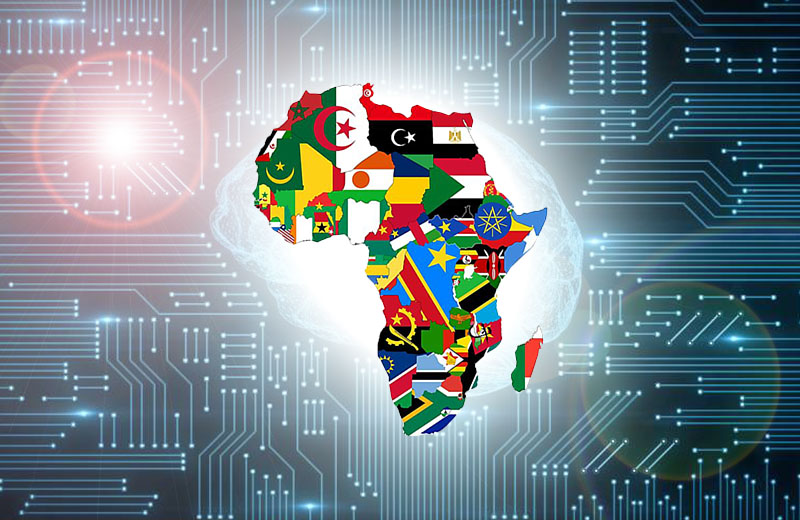For decades, the narrative surrounding Africa in the global media has often been dominated by tales of challenges, political instability, and developmental struggles. While these realities persist in certain pockets, a seismic, often overlooked, shift is rapidly transforming the continent: the rise of a vibrant, innovative, and deeply impactful tech ecosystem. Far from being a mere spectator, Africa is emerging as a global hotspot for technological innovation, particularly in the realm of FinTech, giving birth to a phenomenon affectionately dubbed “Silicon Savannah.”
This digital renaissance is not simply about adopting Western technologies; it’s about pioneering solutions uniquely tailored to African contexts, often “leapfrogging” traditional infrastructure entirely. Driven by unparalleled mobile phone penetration, a youthful and increasingly educated population, and a pressing need for scalable solutions, Africa’s tech sector is unlocking immense economic potential and reshaping the lives of hundreds of millions.
The Bedrock: Mobile Penetration and Digital Inclusion
The foundation of Africa’s tech revolution lies unequivocally in the ubiquitous mobile phone. While fixed-line infrastructure remained largely underdeveloped across much of the continent, mobile networks expanded rapidly and affordably. Today, over 80% of Africans own a mobile phone, and smartphone penetration continues to surge, particularly among the youth. This widespread access to mobile technology, often the first and only gateway to the internet for many, has created fertile ground for digital innovation.
The concept of “leapfrogging” is critical here. Instead of building costly, time-consuming physical bank branches or laying extensive fibre optic cables across vast, sparsely populated regions, African entrepreneurs and consumers embraced mobile technology as a direct pathway to services. This bypassed traditional developmental stages, enabling rapid adoption of digital solutions for everything from financial transactions to healthcare information.
This digital inclusion has been transformative. For millions who were previously unbanked or underserved by traditional financial institutions, a mobile phone has become their bank, their payment system, and their connection to the global economy. It is this profound shift that truly ignited the “Silicon Savannah.”
FinTech: The Unstoppable Wave
At the heart of Africa’s tech revolution is FinTech – financial technology. The continent’s unique challenges, such as a large informal economy, limited access to formal banking, and a significant diaspora reliant on remittances, created a powerful demand for innovative financial solutions.
M-Pesa: The Pioneer’s Tale
No discussion of African FinTech is complete without acknowledging Kenya’s M-Pesa. Launched in 2007 by Safaricom, a Vodafone affiliate, M-Pesa (meaning “mobile money” in Swahili) was initially conceived as a microfinance loan repayment system. It quickly evolved into a revolutionary mobile money transfer service, allowing users to send and receive money, pay bills, and even access micro-loans and savings directly from their basic mobile phones, using simple SMS commands.
M-Pesa’s success was staggering. It provided a secure, efficient, and affordable alternative to cash for millions of Kenyans, many of whom had never had a bank account. It effectively democratized financial services, bringing financial inclusion to the masses. Its impact on Kenya’s GDP has been significant, and its model has been replicated, adapted, and expanded across Africa and beyond. Today, M-Pesa boasts over 50 million active users across seven African countries, processing billions of dollars in transactions annually. Its ecosystem has grown to include mobile banking, payment for goods and services, and even cross-border remittances.
The FinTech Ecosystem Expands:
M-Pesa’s blueprint demonstrated the immense potential of mobile-first financial services, inspiring a wave of innovation across the continent.
- Nigeria: Africa’s most populous nation, Nigeria, has emerged as a FinTech powerhouse. Companies like Paga, Paystack (acquired by Stripe for over $200 million), and Flutterwave (valued at over $3 billion, a true African unicorn) have built robust payment infrastructure, facilitating online transactions for businesses and individuals. These platforms are not just catering to local needs but are expanding across the continent and connecting African businesses to global markets.
- South Africa: With a more developed traditional banking sector, South African FinTech companies often focus on optimizing existing financial services, offering innovative payment gateways like Ozow and PayU, and providing digital solutions for SMEs, such as Yoco’s mobile point-of-sale devices. The country also has a growing interest in blockchain and cryptocurrency applications.
- Ghana, Egypt, and Others: Nations like Ghana (with its mobile money interoperability), Egypt (rapidly growing digital payment landscape), and Tanzania (pioneering mobile insurance) are all witnessing explosive growth in their FinTech sectors, tailoring solutions to their unique market demands.

This vibrant FinTech ecosystem is doing more than just facilitating transactions; it’s empowering small and medium-sized enterprises (SMEs), boosting e-commerce, streamlining remittances, and fostering a digital economy that is increasingly integrated with global financial systems. The recent interest in decentralised finance (DeFi) and cryptocurrencies is also picking up, with many Africans seeing crypto as a hedge against inflation and a way to bypass traditional financial hurdles.
The Lighthouses of Innovation: Africa’s Tech Hubs
While innovation is spread across the continent, certain cities have solidified their positions as vibrant tech hubs, acting as magnets for talent, investment, and entrepreneurial activity.
- Nairobi, Kenya: The Original “Silicon Savannah”
Beyond M-Pesa, Nairobi continues to be a hotbed for innovation, particularly in mobile-first solutions. The presence of iHub, one of Africa’s oldest and most influential tech incubators, has fostered a collaborative environment. Nairobi’s tech scene extends beyond FinTech to include agri-tech (e.g., Twiga Foods), health-tech, and renewable energy solutions. Its strategic location and relatively stable political environment make it attractive to international investors. - Lagos, Nigeria: The Giant Awakens
With a population of over 20 million, Lagos represents a massive market and a dynamic entrepreneurial spirit. Known for its sheer volume of startups and its impressive venture capital inflows, Lagos is a powerhouse in FinTech (as mentioned), but also dominates in e-commerce (Jumia, Konga), media tech (IrokoTV), and logistics. The city’s bustling energy and a large, young talent pool fuel its rapid growth, often seen as Africa’s equivalent of Silicon Valley in terms of sheer scale and ambition. - Cape Town, South Africa: The Gateway for Innovation
South Africa’s “Mother City” boasts a more mature tech ecosystem, supported by robust infrastructure, strong universities, and a deep talent pool. Cape Town’s tech scene is diverse, encompassing FinTech, HealthTech, EduTech, AI, and even space tech. It often serves as a gateway for international companies looking to establish a foothold in Africa due to its established legal frameworks and investor-friendly environment. Incubators like Plug and Play Tech Center and LaunchLab contribute to its vibrant startup culture. - Kigali, Rwanda: The Emerging Model
Rwanda might be smaller in scale, but Kigali’s rise as a tech hub is remarkable, driven by a visionary government committed to digital transformation. President Paul Kagame’s administration has championed tech-friendly policies, invested heavily in fibre optic infrastructure, and established initiatives like the Kigali Innovation City (KIC), aiming to create a pan-African tech ecosystem. Kigali is attracting significant international interest, focusing on smart city solutions, drone technology (Zipline), and high-tech manufacturing, aiming to be Africa’s Singapore. - Other Notable Hubs: Accra (Ghana), Cairo (Egypt), Tunis (Tunisia), and Casablanca (Morocco) are also experiencing significant tech growth, each with their unique strengths and regional influences, contributing to a truly continent-wide digital transformation.
Beyond FinTech: Diversifying the Digital Landscape
While FinTech remains the undisputed leader, Africa’s tech innovation extends far beyond financial services, addressing critical needs across various sectors:
- E-commerce: Platforms like Jumia (often dubbed “Africa’s Amazon”) and Konga have revolutionized retail, connecting consumers to a wider array of goods and services, despite facing logistical challenges related to last-mile delivery and address verification. Smaller, niche e-commerce players are also thriving, focusing on specific products or regions.
- Health-Tech: From telemedicine apps that connect patients in remote areas with doctors (e.g., Babylon Health in Rwanda) to digital health record systems and supply chain solutions for medical supplies (e.g., LifeBank in Nigeria), tech is addressing critical gaps in healthcare access and efficiency.
- Agri-Tech: Given that agriculture is the backbone of many African economies, tech solutions are optimizing farming practices, providing weather forecasts, connecting farmers to markets, and facilitating access to credit and inputs (e.g., Farmcrowdy).
- Ed-Tech: With a rapidly growing youth population, online learning platforms, digital content, and skill-building initiatives are emerging to address educational disparities and prepare the workforce for the digital age (e.g., uLesson).
- Renewable Energy/Clean-Tech: Tech is crucial in addressing Africa’s energy deficit. Companies are developing off-grid solar solutions, mini-grids, and innovative payment models that make clean energy accessible and affordable for millions who lack grid connection.
The Investment Avalanche: Fueling Growth
The burgeoning success of African tech startups has not gone unnoticed by global investors. Billions of dollars in venture capital have poured into the continent in recent years, signaling a clear recognition of its immense potential.
In 2021, African startups raised over $5 billion, more than tripling the amount from the previous year. While there was a slight dip in 2022 and 2023 due to global economic headwinds, the long-term trend remains upward. This capital is coming from a mix of sources:

- Local VC Firms: Funds like Ventures Platform, TLcom Capital, and Novastar Ventures are leading early-stage investments, leveraging their deep understanding of local markets.
- International Investors: Global giants like Stripe, Sequoia Capital, Andreessen Horowitz, and Visa have made significant investments or acquisitions, validating the potential of African startups on a global scale. Development finance institutions (DFIs) also play a crucial role.
- Angel Investors and Accelerators: A growing network of angel investors, combined with the presence of international accelerators like Y Combinator and Techstars, are nurturing early-stage ventures.
This influx of capital is critical for scaling operations, attracting talent, and developing new products. It signifies a shift in perception, moving away from viewing Africa as a recipient of aid to a continent of innovation and investment opportunity.
Enablers and Drivers of Transformation
Several interconnected factors are propelling Africa’s tech revolution:
- Demographic Dividend: Africa has the youngest and fastest-growing population in the world. This youth bulge represents a vast pool of tech-savvy consumers and a dynamic workforce eager to embrace digital solutions.
- Diaspora Engagement: The African diaspora plays a crucial role, bringing back capital, expertise, and networks from global tech hubs, fueling entrepreneurship and innovation on the continent.
- Government Support and Policy: While varying by country, many African governments are increasingly recognizing the importance of technology. They are investing in digital infrastructure, creating regulatory sandboxes for FinTech, and offering incentives to attract tech companies and talent. Rwanda and Kenya are prime examples of this proactive approach.
- Pan-African Integration: Initiatives like the African Continental Free Trade Area (AfCFTA) aim to create a single market across the continent, fostering cross-border collaboration and enabling tech companies to scale their solutions more easily across national boundaries.
Navigating the Hurdles: Challenges on the Path
Despite the undeniable progress, Africa’s tech sector faces significant challenges that need to be addressed for sustained growth:
- Infrastructure Gaps: While mobile penetration is high, reliable and affordable internet connectivity, especially outside major urban centres, remains a challenge in many areas. Consistent access to electricity is also a persistent issue, impacting operations and digital inclusion.
- Regulatory Inconsistencies: Operating across 54 diverse nations means navigating a complex patchwork of regulations, intellectual property laws, and data privacy policies. Harmonization and clarity are crucial for scaling pan-African solutions.
- Talent Scarcity and Retention: While Africa has a young population, there is a shortage of highly skilled tech professionals (developers, data scientists, cybersecurity experts). “Brain drain” remains a concern, with talented individuals sometimes seeking opportunities abroad. Investing in quality tech education and creating compelling local opportunities are vital.
- Access to Capital (Early Stage): While late-stage funding has increased, many early-stage startups still struggle to secure seed and Series A funding, creating a “valley of death” for promising ventures.
- Cybersecurity and Data Privacy: As digital adoption grows, so does the risk of cyber threats. Robust cybersecurity frameworks and data protection laws are essential to build trust and protect users.
- Localisation: Developing solutions that genuinely understand and cater to the diverse linguistic, cultural, and socio-economic nuances of various African markets is a continuous challenge.
The Road Ahead: Africa’s Digital Future
The trajectory for Africa’s tech sector is overwhelmingly positive. FinTech will continue to expand its reach, deepening financial inclusion and enabling new economic models. We can expect significant growth in sectors like health-tech, agri-tech, and renewable energy, as tech solutions address the continent’s most pressing developmental challenges.
The increasing focus on Artificial Intelligence (AI), Internet of Things (IoT), and Web3 (blockchain, decentralised applications) will open new frontiers. African innovators are already exploring AI for disease diagnosis, IoT for smart farming, and blockchain for secure land registries and supply chain transparency.
Africa’s digital transformation is not just about economic growth; it’s about empowering individuals, fostering entrepreneurship, improving public services, and ultimately, reshaping the continent’s global standing. The “Silicon Savannah” is not a fleeting trend but a foundational shift, positioning Africa as a critical player in the global digital economy.
The narrative of Africa is undeniably changing. The rise of “Silicon Savannah” represents a powerful testament to the continent’s ingenuity, resilience, and untapped potential. From the revolutionary impact of M-Pesa to the bustling tech hubs of Lagos and the visionary policies of Kigali, Africa is demonstrating a unique capacity to innovate by “leapfrogging” traditional models and creating solutions that are not only relevant locally but scalable globally.
While challenges remain, the momentum is undeniable. With a burgeoning youth population, increasing access to mobile technology, and growing investor confidence, Africa is not just catching up to the digital world – it is actively shaping its future, building a vibrant, tech-driven economy that promises to transform the lives of its people and contribute significantly to global innovation for decades to come. The world is watching, and Africa’s digital dawn is truly a sight to behold.

